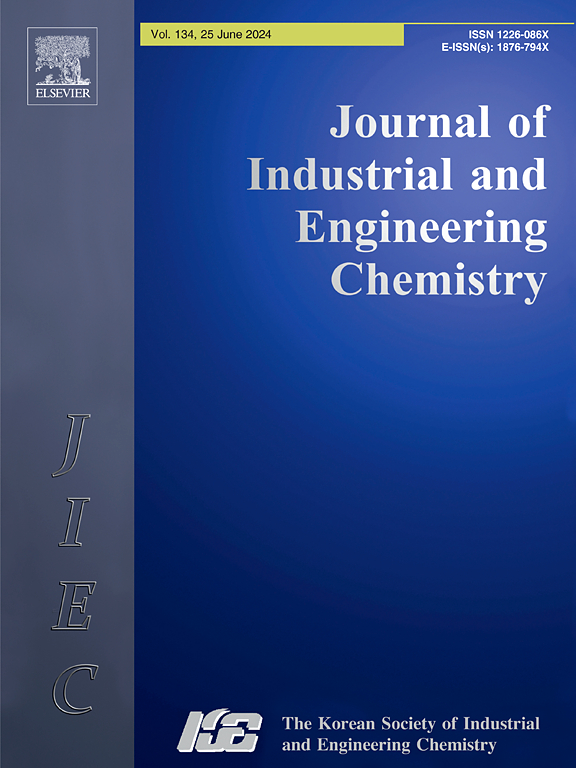柑桔叶提取物制备纳米BaWO4:具有抗菌、抗真菌、抗氧化和抗癌活性
IF 5.9
3区 工程技术
Q1 CHEMISTRY, MULTIDISCIPLINARY
Journal of Industrial and Engineering Chemistry
Pub Date : 2025-02-21
DOI:10.1016/j.jiec.2025.02.039
引用次数: 0
摘要
绿色合成二元金属氧化物(BTMOs)因其简单、经济、环保等优点而受到广泛关注。本研究以柠檬叶提取物为还原剂和稳定剂合成钨酸钡纳米颗粒。采用不同的光谱和分析技术来评估它们的结构、光学、形态和组成特性。广泛评价了BaWO4纳米颗粒的生物活性,显示出显著的抗菌、抗真菌、抗氧化和抗癌潜力。抗菌实验表明,对金黄色葡萄球菌(革兰氏阳性)和大肠杆菌(革兰氏阴性)有显著的抑制作用,对白色念珠菌和黑曲霉有明显的抑制作用。纳米颗粒的抗氧化潜力通过DPPH自由基清除试验进行评估,与维生素C相比,它们表现出更强的活性,突出了它们在中和自由基和减少氧化应激方面的功效。此外,对MCF-7乳腺癌细胞系进行了抗癌活性研究,其中纳米颗粒表现出剂量依赖性的细胞毒性作用,在较高浓度下诱导细胞凋亡,并强调其在癌症治疗中的治疗潜力。本文章由计算机程序翻译,如有差异,请以英文原文为准。

Facile synthesis of BaWO4 nanoparticles using Citrus limon leaf extract: Antibacterial, antifungal, antioxidant, and anticancer activities
The green synthesis of binary metal oxides (BTMOs) has gained substantial attention due to its simplicity, cost-effectiveness, and eco-friendly approach. In this study, barium tungstate (BaWO4) nanoparticles were synthesized using Citrus limon leaf extract as a reducing and stabilizing agent. Different spectral and analytical techniques were employed to assess their structural, optical, morphological, and compositional properties. The biological activities of BaWO4 nanoparticles were extensively evaluated, revealing significant antibacterial, antifungal, antioxidant, and anticancer potential. Antibacterial assays demonstrated notable inhibitory effects against Staphylococcus aureus (Gram-positive) and Escherichia coli (Gram-negative), while antifungal activities were effective against Candida albicans and Aspergillus niger. The antioxidant potential of the nanoparticles was evaluated using DPPH free radical scavenging assays, where they demonstrated superior activity compared to vitamin C, highlighting their efficacy in neutralizing free radicals and reducing oxidative stress. Furthermore, anticancer activity was performed against MCF-7 breast cancer cell lines, where the nanoparticles exhibited dose-dependent cytotoxic effects, inducing apoptosis at higher concentrations and underscoring their therapeutic potential in cancer treatment.
求助全文
通过发布文献求助,成功后即可免费获取论文全文。
去求助
来源期刊
CiteScore
10.40
自引率
6.60%
发文量
639
审稿时长
29 days
期刊介绍:
Journal of Industrial and Engineering Chemistry is published monthly in English by the Korean Society of Industrial and Engineering Chemistry. JIEC brings together multidisciplinary interests in one journal and is to disseminate information on all aspects of research and development in industrial and engineering chemistry. Contributions in the form of research articles, short communications, notes and reviews are considered for publication. The editors welcome original contributions that have not been and are not to be published elsewhere. Instruction to authors and a manuscript submissions form are printed at the end of each issue. Bulk reprints of individual articles can be ordered. This publication is partially supported by Korea Research Foundation and the Korean Federation of Science and Technology Societies.

 求助内容:
求助内容: 应助结果提醒方式:
应助结果提醒方式:


